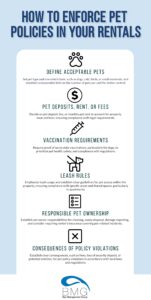How to Create and Enforce Pet Policies in Rental Properties
Most pet owners wouldn’t consider moving anywhere without their pets. As such, that leaves rental owners deciding whether or not to make their properties pet-friendly. After all, many renters own pets, and accepting them into your rentals can widen your tenant pool and reduce vacancies. However, it’s important to carefully consider the pros and cons and learn how to create and enforce pet policies. In today’s article, we’ll review some essential points for rental owners to consider. Read along to learn more.

Contents of This Article:
- Should You Allow Pets in Your Rentals?
- Creating Pet Policies for Your Rentals
- How to Enforce Pet Policies in Your Rentals
- Protect Your Properties With Professional Management
Should You Allow Pets in Your Rentals?
If you’re deciding whether to allow pets in your rentals, it’s important to consider the pros and cons. After all, there are several benefits and disadvantages to allowing pets to live in your rental properties. So, it’s important for landlords and Fairfax property management companies to see both sides to make informed decisions about their properties. Here are a few points to consider if you’re thinking about allowing pets.
Benefits of Allowing Pets in Your Rentals
- Larger Tenant Market- Allowing pets in your rental gives you a wider pool of potential tenants. After all, 72% of renters have pets, but still, it’s hard to find rentals that accept pets.
- Higher Returns- Implementing fees, deposits, or pet rent is common for rental property owners. If there is any pet damage, the tenant can cover some of it with a deposit, non-refundable fees, or a small monthly payment.
- Longer Tenancies- Pet owners tend to stay in rental properties for longer durations. After all, it’s difficult enough to find suitable pet-friendly housing. So, when they find it, they’re more likely to stay to provide stability for their pets. This reduces turnover, saving time and costs associated with finding new tenants.
- Responsible Tenants- Pet owners are often perceived as responsible and caring individuals. As such, they will likely maintain the rental property and promptly report any damage or issues.
Disadvantages of Allowing Pets
- Noise Complaints- Pets can create noise and disturbances, particularly if they bark, cry, or make other disruptive sounds. This can lead to complaints from neighbors and potential conflicts, impacting peace and tranquility.

- Potential Damage- Pets, especially dogs and cats, can cause damage to rental properties. Scratched floors, chewed furniture, and stained carpets can all be major issues. Even with pet deposits or additional fees, the repair costs and maintenance may outweigh the benefits.
- Odor Issues- If your tenant isn’t on top of caring for their pets, accidents or overflowing litter boxes can create serious odor issues. The walls and furniture can absorb smells and may eventually become bothersome to neighboring tenants.
- Pet Allergies- Allergies to cats, dogs, and other furry creatures are quite common. As such, it will take a lot of cleaning and disinfecting to eliminate the allergy-causing pet dander when your pet-owning tenant moves out of your property.
Creating Pet Policies for Your Rentals
Developing and enforcing a comprehensive pet policy for rental properties involves careful consideration and clear guidelines. Here’s a list of important factors to include in your pet policy.

- Define Acceptable Pets
- Pet Deposits, Rent, or Fees
- Vaccination Requirements
- Leash Rules
- Responsible Pet Ownership
- Consequences of Policy Violations
Define Acceptable Pets
Decide on the types and sizes of pets you’ll allow in your rental properties. Consider whether you want to allow dogs, cats, birds, small mammals, or other pets. Remember, you’re not obligated to accept pets that you’re uncomfortable with.
Additionally, determine how many pets you’ll allow per unit. Remember to set a reasonable limit to control the number of animals and potential impacts on your property.
Pet Deposits, Rent, or Fees
Determine if you’ll require a pet deposit, a non-refundable pet fee, or monthly pet rent. Pet rent can help offset potential wear and tear on the property and can be incorporated into the lease agreement.
If you plan on charging a pet deposit or one-time pet fee, clearly state the amount and explain how it will be used. Then, follow legal requirements regarding the handling of deposits or fees.
Vaccination Requirements
Specify that tenants must provide proof of up-to-date vaccinations for pets over the age of four months, especially for dogs. This helps ensure the health and safety of the pets and compliance with local regulations.
Leash Rules
Depending on your property type, you may want to emphasize the importance of leashing pets outside the rental unit.

Additionally, you’ll want to provide guidelines on where pets are allowed within the property, especially if your tenant lives in an apartment. For instance, you may restrict pets from certain areas or require them to be on a leash in shared spaces.
Responsible Pet Ownership
Outline responsibilities for tenants in maintaining a clean and sanitary environment. Specify expectations for waste disposal, cleaning up after pets in common areas, and promptly reporting any damages or issues caused by pets. Additionally, consider requiring tenants to carry renter’s insurance that covers pet-related incidents, like property damage or liability for pet-related injuries.
Consequences of Policy Violations
Clearly outline the consequences for violating the pet policies, such as fines, loss of the security deposit, or potential eviction. Additionally, ensure that these consequences comply with local laws and regulations.
How to Enforce Pet Policies in Your Rentals
Creating and enforcing pet policies is crucial to maintain a harmonious living environment and protect your property. That said, here are some steps to effectively enforce pet policies in your rentals.
- Clear Communication- Ensure you communicate and enforce your pet policies to tenants from the beginning. For instance, you’ll want to give tenants a copy of the policies and include them in the documentation when they sign the lease. Additionally, clearly explain your expectations and consequences of policy violations.
- Pet Agreement Addendum- Use a separate pet agreement addendum that outlines the lease’s specific pet-related terms and conditions. Have tenants sign and acknowledge this addendum, indicating their understanding and agreement to comply with your policies.

- Regular Inspections- You’ll want to conduct regular inspections of the rental units to ensure pet policy compliance. While inspecting, look for signs of pet-related damage or breaches of the policies. However, remember to provide tenants with adequate notice as required by local laws before conducting inspections.
- Proper Documentation- If any damages are caused by pets or repeated violations of the pet policies, it’s crucial to thoroughly document them. So, take photos or videos of the damages and keep detailed records of any related incidents or complaints. This documentation can help if you need to take further action.
- Consistency and Fairness- Enforce pet policies consistently and fairly among all tenants. For instance, treat all violations and issues equally, regardless of your relationship with the tenant. This helps maintain fairness and prevents accusations of favoritism or discrimination.
Protect Your Properties With Professional Management
Allowing pets in your rentals is a big decision that requires careful consideration. If you decide to accept pets, you’ll want to create and enforce pet policies to protect your properties. Additionally, to further protect your properties, you’ll want to hire full-service rental property management.
Bay Property Management Group offers comprehensive management services, from rental marketing to tenant screening, rent collection, maintenance, and more. So, if you’re looking for help protecting and managing your rentals in Northern Virginia, contact BMG today.



